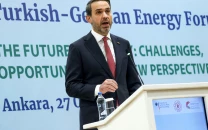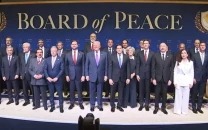India’s media gurus
They are more powerful than any journalist has ever been in print in India and they can turn the national debate.

Rajdeep is one of India’s most famous journalists and has been on Indian news television since it went private two decades ago. At that time, the English news space was occupied mainly by Prannoy Roy’s New Delhi Television, or NDTV. This company grew from having one show on India’s state-run network, Doordarshan, to then managing a station for Rupert Murdoch’s Star to finally launching its own network.
It was the team that Roy put together, comprising young people, many from India’s elite schools, which today dominates English news channels. Rajdeep was part of that group, and both he and Sagarika, his wife, are from Oxford University. Times Now is run by Arnab Goswami, also an NDTV graduate and also from Oxford. Barkha Dutt, wildly popular in Pakistan as I found out last month when I visited Islamabad with her, today runs NDTV as its editor.
These people, who are all still only in their forties, are more influential and with higher profiles than any of their contemporaries in newspapers. I would say they are more powerful than any journalist has ever been in print in India and they can turn the national debate, about which more later.
Because of this, and deservedly so, they make more money than people who work in print. Salaries at their level in television approach a half million US dollars a year or so and then there are stock options for some of them. Television journalism is a tough trade to practice and requires more work than newspapering does. The thing about these people that has made them successful is that, besides their obvious talents, they are all competitive and very hardworking.
When I was at CNN-IBN's studio early for a show one night, I was given an empty cabin to do some work. I could hear (this was around 9.30pm or so) Rajdeep come out of his cabin and give the newsroom a round of shouting for a badly used photograph and a weak headline. It struck me that these were minor things but they upset him greatly. One time, during the Gujarat elections in 2012, we began the day at 7am and finished at 11pm. Through these hours, both Rajdeep and Sagarika, did not flag and remained fresh and enthusiastic, something which some of us, me in particular, could not manage. Even during the breaks, when the cameras were switched off, Sagarika would talk of some development in the story with eyes lit up in excitement. This can only come from love for what one does.
Once on Goswami’s show on Times Now, we went into a break. I was being broadcast from home and on my earpiece could hear him ask the producers — “What’s happening on Barkha’s show?”, “What’s the subject on Rajdeep’s show? Who are the guests?” etc. Such a keen and relentless focus on work is unusual and admirable. In Pakistan, where we were for a track II conference, Barkha spent as much time outside the hall, on her phone doing work as she did inside, while the rest of us were more relaxed.
With their influence, it must be said that these people are liberal and India has benefited from them being as powerful as they are. On all social issues in India, the tone of the debate in the news is forward-looking and against prejudices. This is a great gift from Roy and his protegees to us. It could be felt by The Express Tribune readers that on the subject of Pakistan, this does not hold true, particularly of Times Now, which is often crudely nationalist in its posture, for reasons of editorial positioning. I accept that. But on India’s internal issues, these people have been a very good and very sobering influence, often producing world class content.
When former president Pervez Musharraf visited India in 2001, NDTV had Dawn’s Hameed Haroon on its panel, and the quality of programming and the coverage was outstanding.
I will miss Rajdeep and Sagarika, who along with the rest of the top Network18 team left after the Ambani takeover. I hope they start up another news station because that is their calling.
Published in The Express Tribune, July 6th, 2014.
Like Opinion & Editorial on Facebook, follow @ETOpEd on Twitter to receive all updates on all our daily pieces.



















COMMENTS
Comments are moderated and generally will be posted if they are on-topic and not abusive.
For more information, please see our Comments FAQ